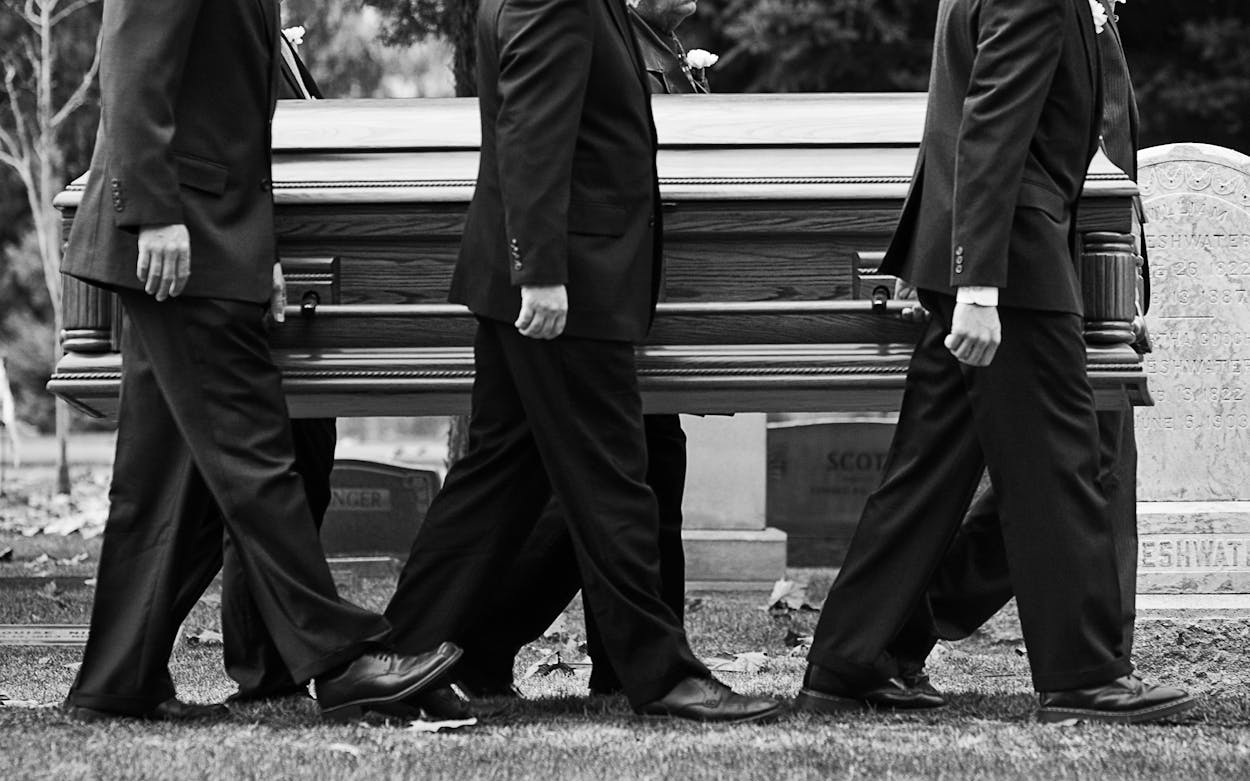John Beckwith III had just driven the corpse of former Olympic sprinter Ronnie Ray Smith, who had died at age 64, down the track for one final hundred-meter dash, and he seemed worried that the stunt, which consisted of a coffin strapped to a go-kart, had not worked as smoothly as he had envisioned. The race was the high point of a “homegoing” celebration orchestrated by Dallas’s Golden Gate Funeral Home, and the subject of the second episode of the TLC cable channel’s reality show Best Funeral Ever about Golden Gate and the over-the-top send-offs for which the business had become well-known.
It had been hard for Beckwith III, a funeral planner at Golden Gate, to figure out how to get the deceased to the finish line, but he made it, after which Smith’s loved ones chanted “Ronnie” and “USA! USA!” before the coffin was placed on a pedestal and presented with a gold medal. When Beckwith III emerged from the go-kart, his father and Golden Gate’s owner, John Beckwith Jr., embraced him. “I know the family’s happy,” he assured him, with a handshake and a hug. “That’s what it’s all about,” replied Beckwith III.
But this was back in 2013, and at present, more than a dozen Dallas-area families are decidedly not happy with John Beckwith Jr. and Golden Gate Funeral Home. As of this week, seventeen civil lawsuits have been filed against Golden Gate, alleging gross negligence, mislaid remains, partially decomposed bodies, and significant emotional harm inflicted upon the bereaved. Lawyers representing the plaintiffs are still hearing from new families with complaints, and told Texas Monthly they anticipate that the number of lawsuits will grow. (Representatives of Golden Gate declined our request for an interview.)
Best Funeral Ever stopped airing in 2014, and none of the current lawsuits stem from the sort of big, flashy celebrations of life that were the focus of the show. Rather, they concern more run-of-the-mill memorials. If everything alleged in court documents is true, Golden Gate Funeral Home consistently displayed an alarming dearth of professionalism and organization.
When Nekeya Webster’s father died at the end of 2018, she called Golden Gate because the funeral home was so well-known, it was the first to pop into her head. “Just like when you’re hungry, you think of McDonald’s, even though that may not be the healthiest thing,” she told me over Zoom. At first, the process went smoothly. The staff was friendly and caring when they went to pick up the body from Houston, where Webster’s father had died, and bring it back to Dallas, his hometown. Webster, 39, a real estate agent, went over the memorial plans multiple times, including the specific hymn the family wanted played during the funeral.
But at the viewing, Webster was shocked by the state of her father’s body. His nails were dirty, and Webster says an odor emanating from him was so bad she had to step out of the room for fresh air. At the funeral the next day, she said, Golden Gate’s chapel was dirty, with used tissues on the floor leftover from an earlier memorial. Staff at the funeral home played a different song from the one the family had agreed upon, and when Golden Gate gave Webster a copy of the funeral’s slideshow and the leftover programs, they were from someone else’s service, not her father’s.
According to Webster, the mistakes continued. Golden Gate was supposed to cremate the remains and alert her when they were ready. She didn’t hear from funeral home staff for months, she says. Unable to get someone to help her by phone or email, Webster showed up at Golden Gate in October—ten months after her father’s service— to find out what was going on. But Golden Gate couldn’t give her the cremains. “I was told they’d scattered my dad’s ashes at their sister cemetery in Tallulah, Louisiana,” alleges Webster. “I have no ties to Tallulah, Louisiana. I had never heard of Tallulah, Louisiana, before this moment.”
Webster was deeply confused by the whole ordeal. How could a famous mortuary business, one with a television show devoted to its success, get the basics of after-death care so wrong? But a year and a half later, in spring 2021, when she learned from a news report that other families had filed suit against Golden Gate for similar experiences, she felt relief. She was not alone.
In February 2021, a former Golden Gate employee named Isaiah Darris came forward as a whistleblower, providing Spectrum News with a photograph that depicted what Darris identified as decomposing corpses stacked in a rental trailer in the parking lot of the mortuary. Later that month, the family of Virginia Palmer Rankin, of Dallas, became the first to file suit. Rankin died at the age of 63 in December 2019, and her children allege, based on mismatched identification numbers, that Golden Gate gave them ashes that were not their mother’s. A second suit was filed in May, by Jodie Jackson, 49, whose son was killed in a motorcycle accident in August 2019. Jackson, who works in auto finance, says when she went to collect her son’s cremains, an employee at Golden Gate told her they were so voluminous they required two urns, one of which was so heavy Jackson could not carry it to her car. (Because her son’s ashes should have filled up only one third of an urn, the court filing alleges that “it is estimated that the urns contain ashes from at least three adults.”) In September 2021, Nekeya Webster became the third to file suit against the funeral home.
Many of the details in the now seventeen court filings match what Webster alleges happened with her father’s body. There are several accounts of misplaced cremains; one suit even alleges that a loved one’s ashes were disposed of “by scattering them into the foliage behind the funeral home.” There are also multiple allegations that bodies appeared partially decomposed during viewings and funerals. One plaintiff says when he was shocked by the condition of his father’s body, he was told “the appearance was due to a failure to ‘thaw’.” When another woman went to Golden Gate to view her mother’s body before the wake scheduled for later that day, she was presented with someone else’s remains. When staff finally located her mother, she was still in her hospital gown, without makeup or cosmetics, and showed evidence of considerable decay. According to the court filing, her “abdomen was severely bloated. Her skin had dark splotches and discoloration.” With the wake set to take place in a matter of hours, the daughter says she had no choice but to prepare her mother’s body herself, using her own makeup and perfume that she keeps in her purse.
Since the coronavirus pandemic struck nearly two years ago, news stories around the country have reported on morgues and funeral homes overrun with bodies, relying on refrigerated trucks for additional storage. But five of the most recent lawsuits against Golden Gate concern deaths that occurred prior to March 2020, and the Texas Funeral Service Commission has records of complaints against Golden Gate that date as far back as 2007. A public information request, filed by lawyers for the plaintiffs, shows that three complaints were resolved with the commission finding that a violation of Texas Occupations Code Chapter 651 on Crematory Services, Funeral Directing, and Embalming had occurred.
In each lawsuit, the plaintiffs are seeking monetary relief of $1,000,000 from Golden Gate Funeral Home and John Beckwith Jr. While a legal representative for Golden Gate did not respond to our request an interview, an attorney did issue a statement to local news media in late January: “Golden Gate is a family-owned and operated business that has provided care and services to the Dallas Community for generations. We will not comment on this pending litigation, except to state that we plan to respond to the allegations made against us and defend against these claims in a court of law.” The Golden Gate Funeral Home has filed a general denial to the lawsuits which reads, in part, “Defendants generally deny each and every, all and singular, the assertions alleged. . . .” The lawsuits filed in 2021 have trial dates set for later this year, beginning in April.
- More About:
- Film & TV
- Television
- Dallas








